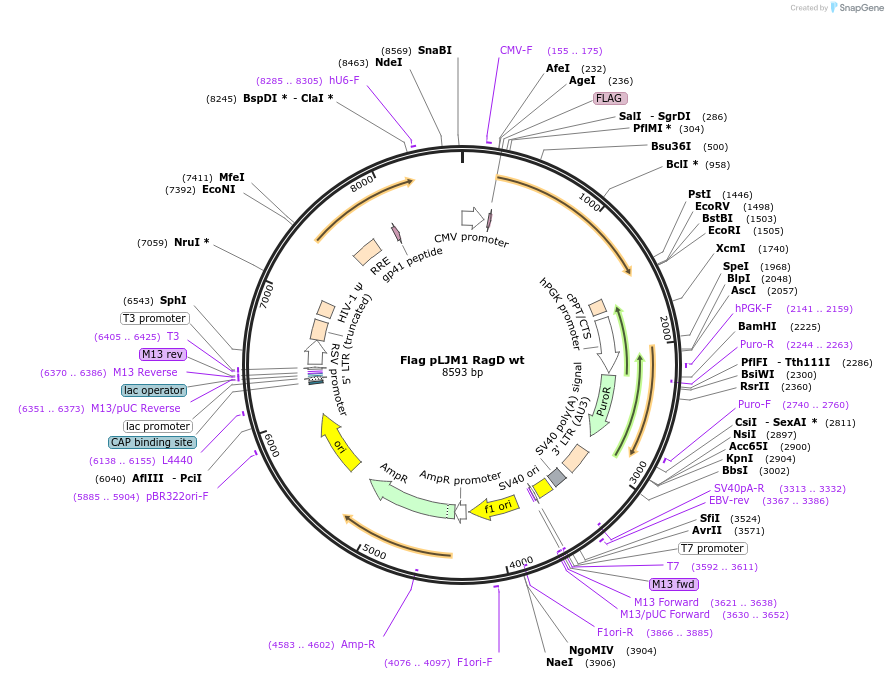-
Depositing Lab
-
Publication
-
Sequence Information
Ordering
| Item | Catalog # | Description | Quantity | Price (USD) | |
|---|---|---|---|---|---|
| Plasmid | 19316 | Standard format: Plasmid sent in bacteria as agar stab | 1 | $85 | |
Backbone
-
Vector backbonepLJM1
- Backbone size w/o insert (bp) 7400
-
Vector typeMammalian Expression, Lentiviral
-
Selectable markersPuromycin
Growth in Bacteria
-
Bacterial Resistance(s)Ampicillin, 100 μg/mL
-
Growth Temperature37°C
-
Growth Strain(s)Stbl3
-
Growth instructionsGrow in Exel10Gold or Stbl2 cells
-
Copy numberHigh Copy
Gene/Insert
-
Gene/Insert nameRas-related GTP binding D
-
Alt nameRRAGD
-
SpeciesH. sapiens (human)
-
Insert Size (bp)1200
-
Entrez GeneRRAGD (a.k.a. RAGD, bA11D8.2.1)
-
Tag
/ Fusion Protein
- Flag (N terminal on insert)
Cloning Information
- Cloning method Restriction Enzyme
- 5′ cloning site SalI (not destroyed)
- 3′ cloning site EcoRV (not destroyed)
- 5′ sequencing primer CMV-F (Common Sequencing Primers)
Resource Information
-
Articles Citing this Plasmid
Terms and Licenses
-
Academic/Nonprofit Terms
-
Industry Terms
- Not Available to Industry
Trademarks:
- Zeocin® is an InvivoGen trademark.
Depositor Comments
pLJM1 is based on pLKO.1. pLJM1 was cut with AgeI and EcoRI and a Flag tag was cloned in. The cDNA was cloned into Flag-pLJM1 with SalI and EcoRV. The sequence across the MCS includes AgeI-Flag-SalI-gene-EcoRV-EcoRI
These plasmids were created by your colleagues. Please acknowledge the Principal Investigator, cite the article in which the plasmids were described, and include Addgene in the Materials and Methods of your future publications.
-
For your Materials & Methods section:
Flag pLJM1 RagD wt was a gift from David Sabatini (Addgene plasmid # 19316 ; http://n2t.net/addgene:19316 ; RRID:Addgene_19316) -
For your References section:
The Rag GTPases bind raptor and mediate amino acid signaling to mTORC1. Sancak Y, Peterson TR, Shaul YD, Lindquist RA, Thoreen CC, Bar-Peled L, Sabatini DM. Science. 2008 Jun 13. 320(5882):1496-501. 10.1126/science.1157535 PubMed 18497260

